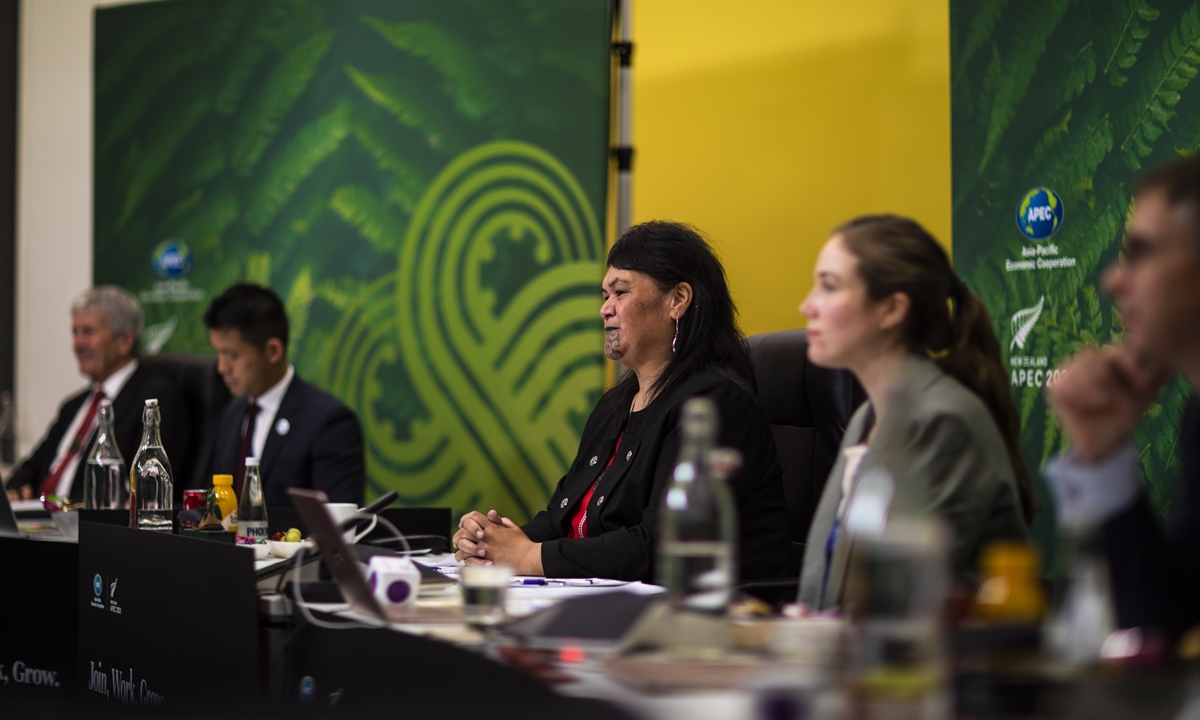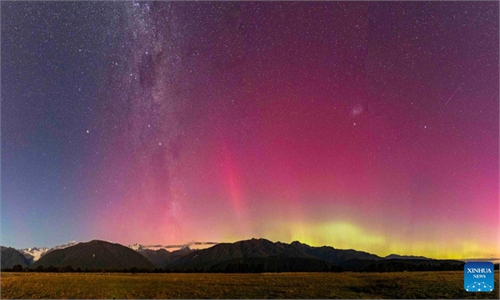
New Zealand Foreign Affairs Minister Nanaia Mahuta (center) attends the APEC Ministerial Meeting (AMM) media conference as AMM Co-Chair in Wellington, New Zealand on November 10, 2021. Photo: Papers
At the invitation of State Councilor and Foreign Minister Qin Gang, New Zealand Foreign Minister Nanaia Mahuta will visit China from Wednesday to Saturday, in what the New Zealand's new prime minister Chris Hipkins described as the country's "first significant in-person ministerial visit since the global pandemic." Chinese analysts said Tuesday such move showed the Pacific country attaches high importance to China relations amid a turbulent global landscape marked by its strategic autonomy.
Mahuta's trip marks the first visit to Beijing by a New Zealand minister since 2019. "New Zealand's relationship with China is one of our most important, complex and wide ranging. I intend to discuss areas where we cooperate, such as on trade, people-to-people and climate and environmental issues," Mahuta said in a statement before her China trip, the Guardian reported.
Speaking at a post-cabinet press conference on Monday, New Zealand's new leader Hipkins, who took office on January 25, 2023, said China was "a very important relationship to New Zealand," and it was "important that we reestablish those in-person opportunities to engage country-to-country." Hipkins said he may also visit China later this year, but no trip had been confirmed yet.
Earlier in February, Hipkins together with his Australian counterpart Antony Albanese talked up their relations with China - their largest trading partner. Hipkins said China was "an incredibly important partner" for New Zealand, even if the two "disagree from time to time."
Mahuta's Beijing visit right after the easing of COVID-19 travel curbs demonstrates the country's attachment of high importance to China relations, and the new government could maintain its strategic autonomy despite pressure from US-led Western allies, Chen Hong, director of the Australian Studies Centre at East China Normal University, told the Global Times on Tuesday.
More importantly, Wellington could use Mahuta's trip in Beijing to lay the ground for prime minister Hipkins's future visit. High-level exchanges between New Zealand and China would provide guidance for the future path for the development of bilateral ties and explore how New Zealand would coordinate with Chinese path to modernization and substantially benefit the two peoples, Chen noted.
Mahuta will also touch on the country's concerns about key security challenges such as the Ukraine crisis, as well as advocate for outcomes reflecting New Zealand's values on human rights issues during her meeting with Qin, according to the Guardian report.
These gestures are a reflection of pressures from New Zealand's allies such as the US and Australia, and New Zealand is clear-headed about its practical interests in its China ties and would not give away its autonomy, Yu Lei, chief research fellow at the research center for Pacific island countries of Liaocheng University in East China's Shandong Province, told the Global Times on Tuesday.
China is New Zealand's largest trading partner by a considerable margin, accounting for about 30 percent of New Zealand's total exports. New Zealand exports a total $21.45 billion of goods and services to China, per New Zealand government website.
Chinese observers predicted the two sides would advance cooperation in fields such as trade and responding to the climate change and environmental protection. Tourism and education would also be new engines for advancement of people-to-people exchanges, they said.
When asked if New Zealand would join China to protest regional hot-spot issues - AUKUS and Japan's dumping of nuclear-contaminated water, Chinese analysts expressed different opinions.
New Zealand has a firm stance of building a strictly nuclear free zone in its territorial sea, land and airspace throughout the history, so that it could share a common ground with China in protesting the introduction of nuclear weapons in the Asia-Pacific region. The concerns of environmental threats brought by Japan's dumping of nuclear-contaminated water are also shared by both China and New Zealand, Chen said.
Yu predicted that New Zealand, although being discontented with Australia and Japan over their handling of those matters, may not explicitly join China in condemning these actions.




